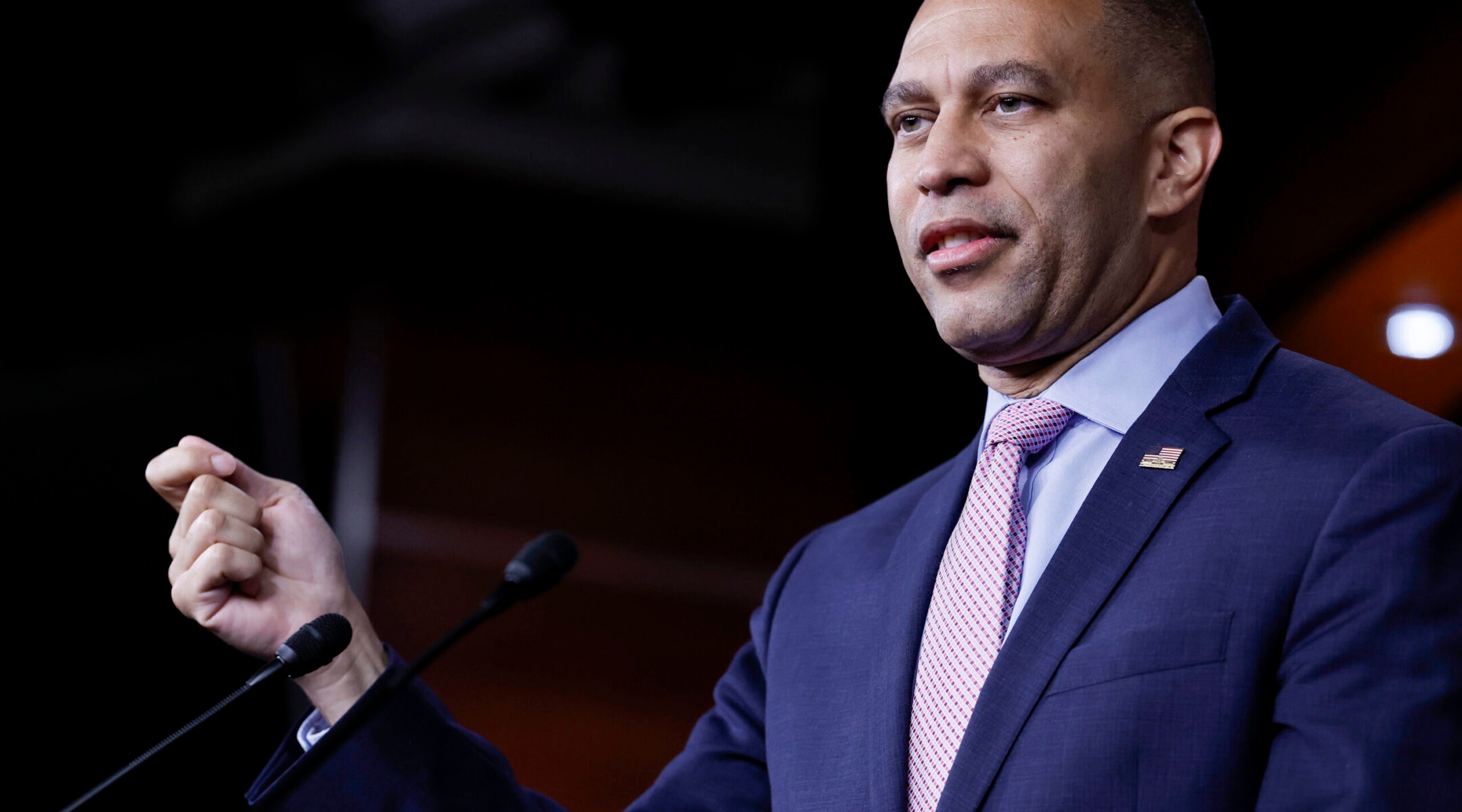JERUSALEM (JTA) — The Israeli government’s effort to weaken the country’s judiciary will not affect American military aid to Israel, Democratic Rep. Hakeem Jeffries told reporters on a visit to Jerusalem on Monday.
Jeffries, the Brooklyn congressman and House minority leader, was leading a delegation to Israel of 24 Democratic members of Congress. He spoke to reporters following a meeting with Israeli Prime Minister Benjamin Netanyahu, who has said he also seeks broad agreement but has pledged to press ahead with the judicial overhaul, despite ongoing mass street protests.
Jeffries echoed President Joe Biden’s stance that any laws changing Israel’s court system should pass only with broad consensus. The first piece of the legislative package, which was enacted in late July, passed along party lines, with the right-wing governing coalition voting in favor and Israel’s parliamentary opposition boycotting the vote.
“It’s my hope that whatever continued efforts occur related to judicial reform, that there’s a broad consensus across the ideological spectrum before additional changes are undertaken,” Jeffries said in the small press conference at the King David Hotel here. The trip is run by an organization affiliated with the American Israel Public Affairs Committee, or AIPAC.
“It’s not my job to articulate the precise contours of what judicial reform should look like here in Israel,” he added, saying that Netanyahu had also pledged to him that Israel would remain a liberal democracy. “That’s for the Israeli people to decide, through their elected representatives and through their actions to petition the government to perhaps go in a different direction.”
But even if Israel’s government did end up sapping the power of its judiciary, Jeffries said the United States would not reduce its military aid to Israel. That idea, once taboo, has been gaining steam lately, with voices on both sides of the aisle floating it. A number of Democratic members of Congress have called on the United States to establish conditions restricting the use of the nearly $4 billion in annual funding, and last month, New York Times columnist Nick Kristof floated ending aid to Israel entirely.
Jeffries rejected that idea, drawing a distinction between the democratic values Israel shares with the United States and the two countries’ shared strategic interests in the Middle East. Jeffries made clear that an independent and credible judiciary was a component of the United States’ and Israel’s shared values, but said the shared interests would remain in any event.
“At the end of the day, the two things that bind our countries together relate both to our shared democratic values and our shared strategic interests — shared strategic interests related to the very tough neighborhood that Israel lives in,” he said. “The need to make sure that we maintain Israel’s qualitative military edge will still be with us regardless of where Israel lands in terms of the judicial reform.”
In recent months, dozens of Democratic congresspeople have signaled their support for the mass street protests in Israel and abroad against the judicial overhaul. Late last month, a dozen Democratic representatives introduced a resolution in solidarity with the protests and one of them, Rep. Jan Schakowsky, from the Chicago-area, spoke at an anti-overhaul rally in her district. Jeffries indicated support for the protests as well, likening them to the exercise of First Amendment rights in the United States.
“The protesters have a right to express themselves, and their very presence is a sign of strength for Israeli democracy,” he said. “Freedom of assembly and the right to petition your government to demand change — that is exactly what is happening in Israel in a very vociferous way in connection with the demonstrations protesting the judicial overhaul. That’s a sign of a vibrant democracy.”
He denied that Israel’s harshest critics in the Democratic Party had made significant inroads. In July, six Democrats boycotted Israeli President Isaac Herzog’s speech to a joint session of Congress, shortly after Rep. Pramila Jayapal, an influential progressive, called Israel a “racist state” — a remark she walked back. A Gallup poll in March found that Democrats were more likely to sympathize with the Palestinians than with Israel.
Jeffries pointed to a pro-Israel resolution in response to Jayapal’s remarks that passed Congress 412-9.
“The Democratic Party in the House of Representatives will continue to stand with Israel and lift up the special relationship between our two countries and in support of Israel’s right to exist as a homeland for the Jewish people, and as a Jewish democratic state, period, full stop,” he said.
Jeffries did not comment on some of the hot-button topics surrounding Israel and its relationship with the United States — including when Biden might invite Netanyahu to the White House. He also did not comment on the possibility that Netanyahu might not respect a potential court ruling striking down the judicial reform legislation. Israel’s Supreme Court is due to hear arguments about the law next month, and Netanyahu has thus far dodged the question of whether he would abide by a court decision invalidating the law.
In addition to Netanyahu, Jeffries met with Palestinian leadership and will meet with Yair Lapid, the centrist leader of Israel’s parliamentary opposition.
The Democratic delegation’s visit to Israel also came amid escalating Israeli-Palestinian violence, and Jeffries said his delegation discussed Palestinian terror attacks with Netanyahu, in addition to discussing attacks by Israeli settlers on Palestinians. Over the weekend, an Israeli settler shot dead a Palestinian in the West Bank, and a Palestinian gunman killed an Israeli security guard in Tel Aviv.
Jeffries advocated for a renewed effort toward Israeli-Palestinian peace and also said Congress would look favorably on a U.S.-brokered normalization agreement between Israel and Saudi Arabia, something the three countries have reportedly been discussing. But he seemed to acknowledge that a deal with the Palestinian leadership was remote.
“At the end of the day, [there’s a] strong interest in our congressional delegation of getting to a place where we can proceed toward a viable path to a two-state solution, recognizing that we are not at that place right now,” he said. “That is a goal that we should not give up on.”





